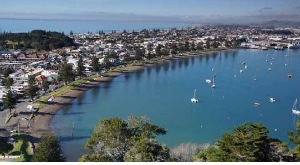“Auckland effect” starts spreading
Skyrocketing SuperCity prices are starting to spread outwards – thanks to Aucklanders buying away from home.
Friday, July 3rd 2015, 12:00AM
by Miriam Bell

Tauranga
Two new sets of data – from QV and Trade Me Property - provide evidence that Auckland’s supercharged housing market is starting to impact on nearby regions.
The latest QV House Price Index shows that Tauranga, Hamilton and the Western Bay of Plenty are seeing rising house values.
In Tauranga average house values were up by 7.3% year on year, while in Hamilton they were up by 4.4% year on year.
QV national spokesperson Andrea Rush said that large numbers of Aucklanders were flocking to buy property in those areas and this was leading to the rising values.
“There are reports that of those present at open homes in Tauranga, as many as 60% are regularly from Auckland, while around 15% of all buyers in the Hamilton market are now from Auckland.”
QV’s Hamilton valuer Chris Price confirmed that 15% of Hamilton sales are Aucklanders.
“They are either using the equity to buy investment properties or are selling up and moving here as they can get more bang for their buck.”
Price said Cambridge was following the upward trend of Hamilton, with local agents reporting that approximately 10% of purchasers are from Auckland.
In Tauranga, there was very strong demand from out of town buyers, with approximately 60% of open home attendees now from Auckland, QV’s Tauranga valuer David Hume said.
“There has been significant demand and increasing property values across Tauranga and the Western Bay of Plenty over the past three months.
“Homes in Tauranga and Papamoa are now selling much more quickly than they have for several years and value levels are now considered to be at or above the 2007 peak.”
Hume said the situation had created a degree of panic for local buyers not wanting to get priced out of the market
“The $300,000 to $500,000 sector of the market is seeing the biggest demand, which is also fuelled by historically low interest rates.”
In the Western Bay of Plenty, Hume said the market was strengthening, sales volumes were up across the board and buyers were coming from far and wide.
Further evidence of the “Auckland effect” comes in new Trade Me Property asking price data released to landlords.co.nz.
Based on asking price expectations, the Waikato saw an increase of 3.3%, the Bay of Plenty saw an increase of 5.1% and Northland saw an increase of 8.5% in the year to May 2015.
Head of Trade Me Property Nigel Jeffries said the trend in average asking price for properties in Waikato, the Bay of Plenty and Northland had been an upward one recently.
“It is hard to tell yet if these regions will benefit from a property price increase ‘creep’ from Auckland, but there are some signs of this.”
For example, the Bay of Plenty had particularly strong asking price growth over the past nine months and reached new record highs
Since September 2014, the Bay of Plenty’s average asking price had increased by nearly $25,000 to hit $432,350 in May.
Sales activity was another important factor to consider as prices tend to follow shifts in sales volume, Jefferies continued.
REINZ sales data showed that Waikato, Bay of Plenty and Northland witnessed much stronger sales activity over the past six months.
He said the data showed all three regions had gained sales volumes, as a proportion of national sales, in recent times.
Meanwhile, the managing director of Hamilton’s largest real estate agency, Lodge Real Estate, has also noted greater numbers of Auckland investors jumping into the city’s property market.
Jeremy O’Rourke said that, due to Auckland’s record house prices, owners had a larger asset base to borrow against.
“We’re seeing them take advantage of this new-found wealth and using borrowed funds to get into property investments here in Hamilton.”
This was beneficial for local sellers because Auckland investors were often willing to pay more for Hamilton properties as they saw them as a “good deal” - relative to similar properties in Auckland.
Auckland investors were particularly active in the lower end of the Hamilton market and this was impacting on both supply and sales times, O’Rourke added.
| « Auckland values over 30% higher than previous peak | Could Auckland’s property market be slowing? » |
Special Offers
Comments from our readers
No comments yet
Sign In to add your comment
| Printable version | Email to a friend |


